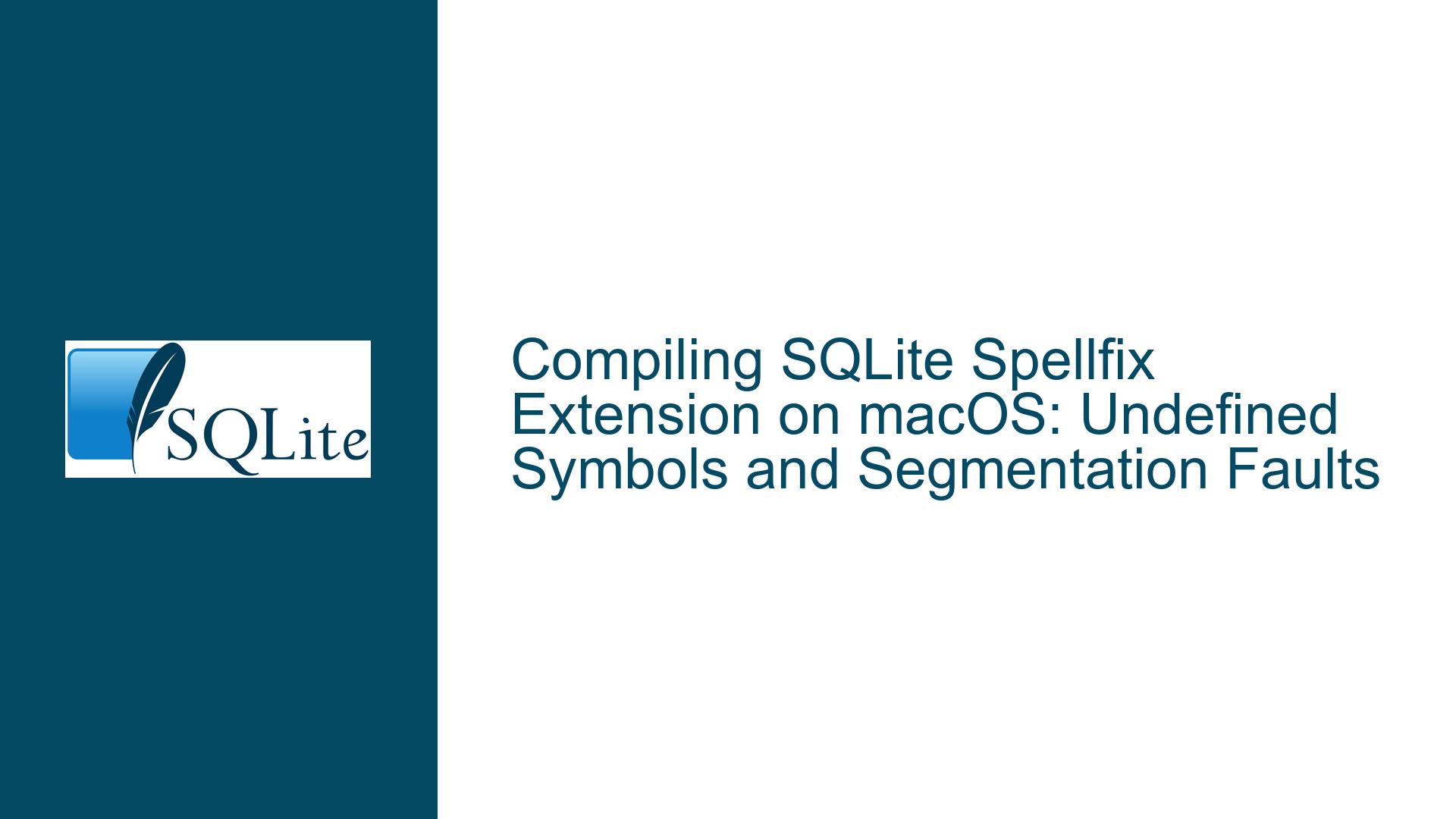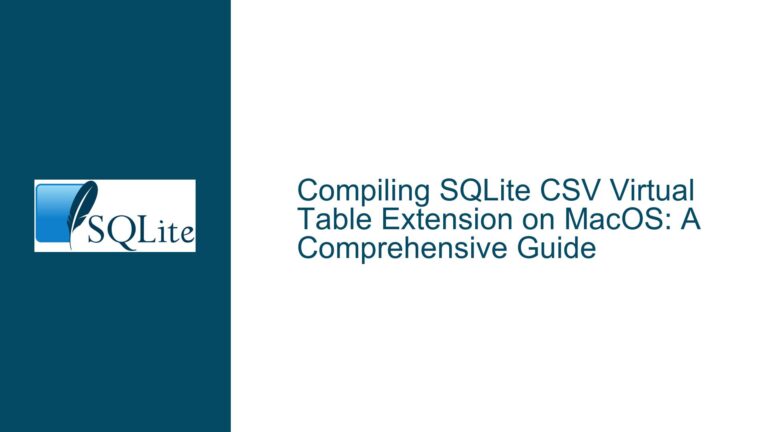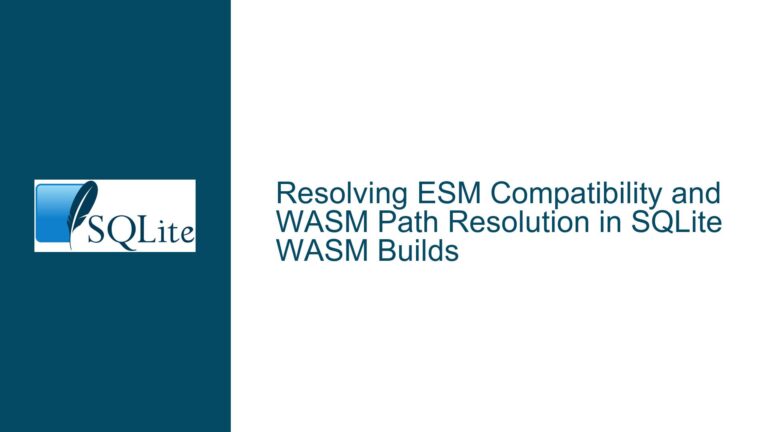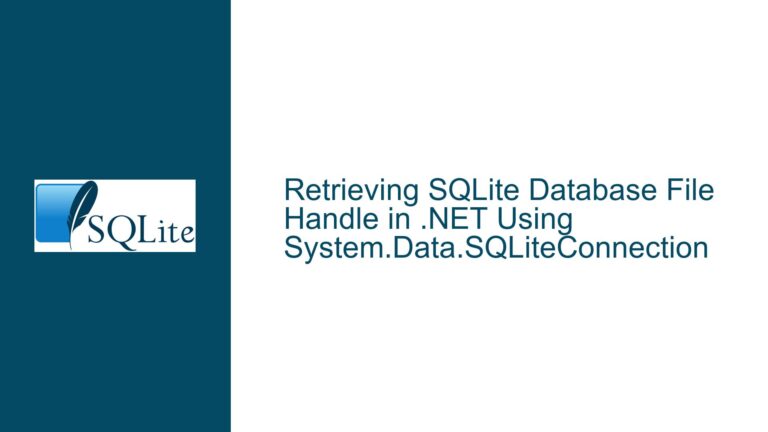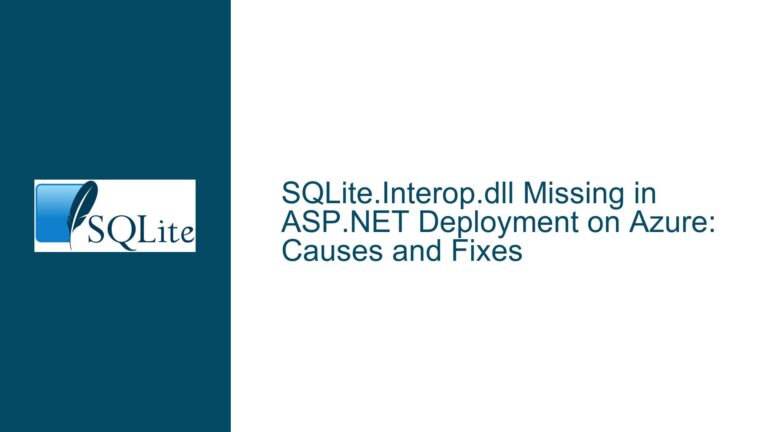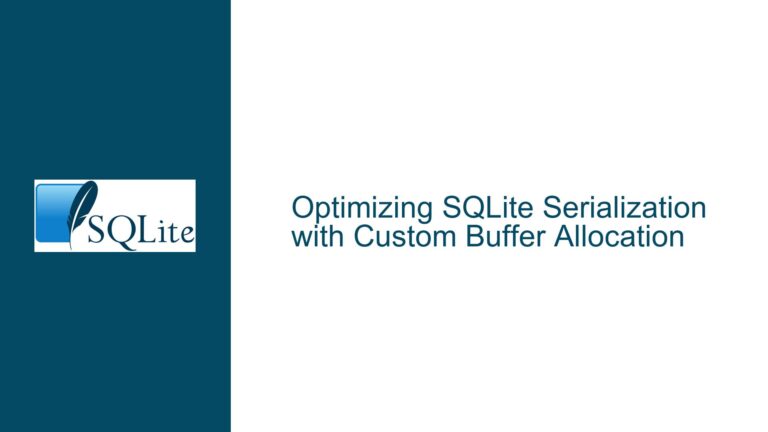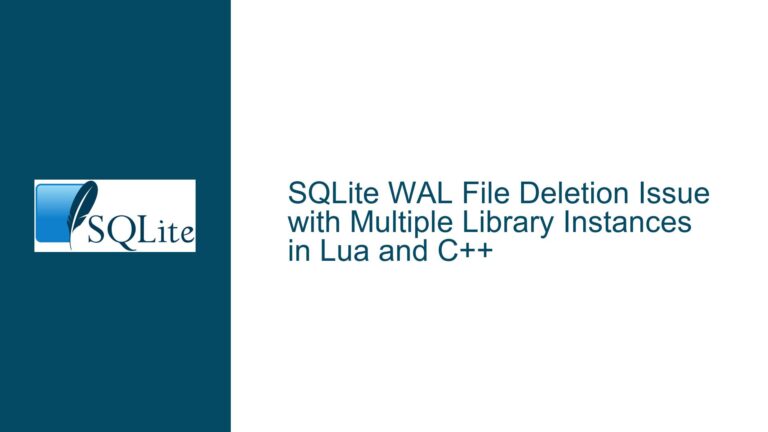Compiling SQLite Spellfix Extension on macOS: Undefined Symbols and Segmentation Faults
Undefined Symbols for Architecture x86_64 During Spellfix Compilation
When attempting to compile the SQLite spellfix extension on macOS, a common error encountered is Undefined symbols for architecture x86_64. This error typically occurs during the linking phase of the compilation process, where the compiler is unable to resolve references to SQLite API functions such as sqlite3_bind_text, sqlite3_column_text, and others. The error message indicates that the linker cannot find the implementations of these functions, which are essential for the spellfix extension to operate correctly.
The spellfix extension is a loadable module that provides approximate string matching capabilities within SQLite. It is implemented in C and relies heavily on the SQLite C API. When compiling such extensions, it is crucial to ensure that the compiler and linker can locate and link against the SQLite library correctly. The error message suggests that the linker is failing to resolve the symbols for the SQLite API functions, which are defined in the SQLite library (libsqlite3).
The compilation process involves several steps: preprocessing, compilation, assembly, and linking. The Undefined symbols for architecture x86_64 error occurs during the linking phase, where the object files generated from the source code are combined into a single executable or shared library. The linker resolves references to external symbols (such as SQLite API functions) by searching through the specified libraries. If the linker cannot find the definitions for these symbols, it throws an Undefined symbols error.
In the case of the spellfix extension, the error is particularly perplexing because the SQLite API functions are well-defined and should be available in the SQLite library. The issue may stem from incorrect compiler or linker flags, missing include paths, or improper handling of the SQLite API macros.
Interrupted Symbol Resolution Due to Missing SQLite API Macros
One of the primary causes of the Undefined symbols for architecture x86_64 error is the failure to properly include and use the SQLite API macros defined in sqlite3ext.h. This header file is essential for loadable extensions, as it provides macros that map SQLite API functions to their corresponding function pointers in the SQLite API structure. These macros are necessary because loadable extensions do not link directly against the SQLite library at compile time. Instead, they resolve the SQLite API functions at runtime through the SQLite API structure.
The sqlite3ext.h header file defines macros such as sqlite3_bind_text, sqlite3_column_text, and others, which map to sqlite3_api->bind_text, sqlite3_api->column_text, and so on. These macros allow the extension to call SQLite API functions indirectly through the sqlite3_api structure, which is populated at runtime when the extension is loaded into SQLite.
If these macros are not defined or are not used correctly, the compiler will treat the SQLite API functions as regular external symbols, leading to the Undefined symbols error during linking. This is because the linker expects to find the implementations of these functions in the SQLite library, but since the extension is supposed to resolve them at runtime, the linker cannot find them.
In the case of the spellfix extension, the error message specifically mentions sqlite3_bind_text as one of the undefined symbols. This suggests that the sqlite3ext.h header file is either not being included correctly, or the macros defined in it are not being used as intended. This could be due to a missing include path, an incorrect include statement, or a misconfiguration in the build process.
Another potential cause of the issue is the use of incorrect compiler or linker flags. When compiling loadable extensions, it is essential to use the correct flags to ensure that the extension is built as a shared library and that the SQLite API symbols are resolved correctly. For example, on macOS, the -dynamiclib flag is used to create a dynamic shared library, and the -lsqlite3 flag is used to link against the SQLite library. However, as seen in the initial attempt, simply adding -lsqlite3 does not resolve the issue and can lead to further problems, such as segmentation faults when loading the extension.
Implementing Correct Compilation Flags and Macro Usage for Spellfix Extension
To resolve the Undefined symbols for architecture x86_64 error and successfully compile the spellfix extension on macOS, it is necessary to ensure that the correct compilation flags are used and that the SQLite API macros are properly defined and utilized. The following steps outline the process of troubleshooting and fixing the issue:
Step 1: Verify the Inclusion of sqlite3ext.h
The first step is to ensure that the sqlite3ext.h header file is included correctly in the spellfix.c source file. This header file must be included before any SQLite API functions are used. The include statement should look like this:
#include "sqlite3ext.h"
SQLITE_EXTENSION_INIT1
The SQLITE_EXTENSION_INIT1 macro is essential for initializing the sqlite3_api structure, which is used to resolve the SQLite API functions at runtime. Without this macro, the SQLite API macros will not be defined, leading to the Undefined symbols error.
Step 2: Use the Correct Compiler and Linker Flags
When compiling the spellfix extension, it is crucial to use the correct compiler and linker flags to ensure that the extension is built as a shared library and that the SQLite API symbols are resolved correctly. On macOS, the following flags should be used:
gcc -g -O2 -shared -fPIC -I/path/to/sqlite3/include -o spellfix.dylib spellfix.c
-g: Generates debug information.-O2: Enables optimization level 2.-shared: Generates a shared library.-fPIC: Generates position-independent code, which is necessary for shared libraries.-I/path/to/sqlite3/include: Specifies the include path for the SQLite header files.-o spellfix.dylib: Specifies the output file name.
Step 3: Ensure Proper Linking Against SQLite
While the -lsqlite3 flag is used to link against the SQLite library, it is not necessary for loadable extensions because they resolve SQLite API functions at runtime through the sqlite3_api structure. However, if the SQLite library is not installed in a standard location, it may be necessary to specify the library path using the -L flag:
gcc -g -O2 -shared -fPIC -I/path/to/sqlite3/include -L/path/to/sqlite3/lib -lsqlite3 -o spellfix.dylib spellfix.c
Step 4: Verify the Use of SQLite API Macros
Ensure that all SQLite API functions are called using the macros defined in sqlite3ext.h. For example, instead of calling sqlite3_bind_text directly, use the sqlite3_bind_text macro:
sqlite3_bind_text(stmt, 1, value, -1, SQLITE_TRANSIENT);
This macro will expand to sqlite3_api->bind_text, which resolves the function at runtime.
Step 5: Test the Compiled Extension
After compiling the spellfix extension, test it by loading it into SQLite:
sqlite3 items.db
sqlite> .load ./spellfix.dylib
If the extension loads successfully without errors or segmentation faults, the compilation process was successful.
Step 6: Debugging Segmentation Faults
If the extension compiles but causes a segmentation fault when loaded, it may indicate that the SQLite API functions are not being resolved correctly. This can be due to incorrect usage of the sqlite3_api structure or missing initialization. Ensure that the SQLITE_EXTENSION_INIT1 macro is used correctly and that the sqlite3_api structure is properly initialized before any SQLite API functions are called.
Step 7: Review the Build Environment
Finally, review the build environment to ensure that the correct version of SQLite is being used and that there are no conflicts with other installed versions. Verify that the include and library paths point to the correct locations and that the SQLite headers and libraries match the version of SQLite being used.
By following these steps, the Undefined symbols for architecture x86_64 error can be resolved, and the spellfix extension can be successfully compiled and loaded into SQLite on macOS. Proper usage of the SQLite API macros and correct compilation flags are key to ensuring that the extension functions as intended.
